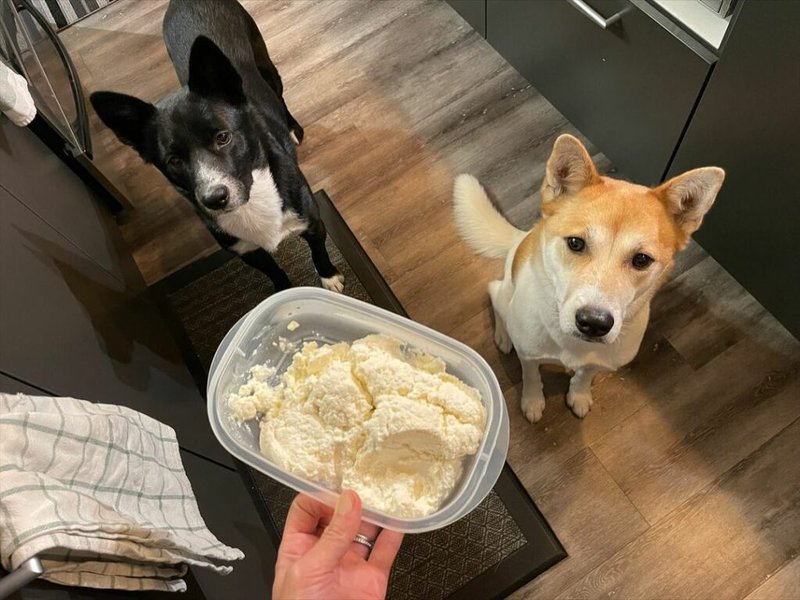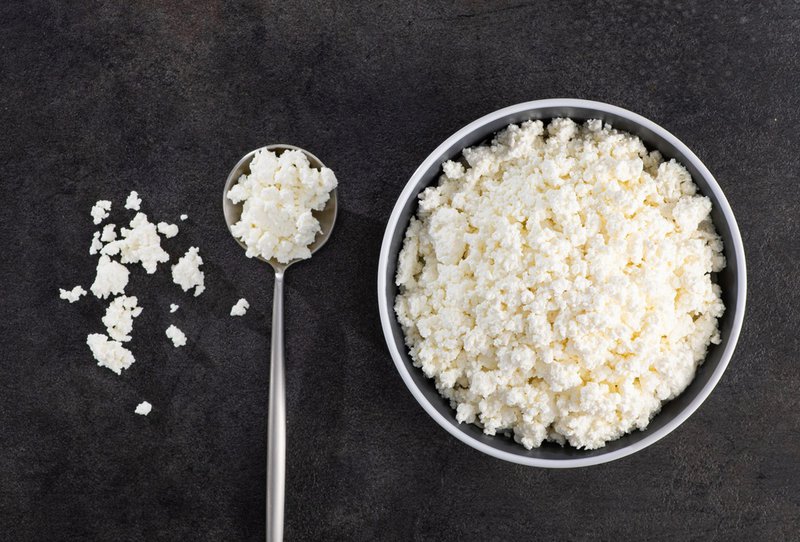Have you ever wondered if giving your fluffy friend a few spoonfuls of cottage cheese is safe? Many dog owners do, especially when looking for a tasty snack to feed their furry companion. But is it safe for your pup to eat cottage cheese?
Yes, dogs can eat cottage cheese, but in moderation. Cottage cheese is an excellent source of calcium and protein for dogs. It can give your pup the necessary nutrients but isn’t overly filling or heavy. Plus, cottage cheese can help keep your pup’s digestive system healthy due to its probiotics. So all you need to do is keep an eye on the amount of cottage cheese your dog consumes.
This article explores why cottage cheese is a suitable snack for your canine. We’ll review its nutrients, potential risks of feeding cottage cheese to dogs, and safe serving sizes. In addition, we’ll cover the symptoms of lactose intolerance to watch for and the breeds most susceptible to such allergies. Before that, let’s go over how cottage cheese benefits your pup!
What Does Cottage Cheese Do For Dogs?

Feeding cottage cheese to dogs is beneficial because it contains several essential nutrients. These include amino acids, calcium, fatty acids, magnesium, potassium, probiotics, protein, and vitamin A.
However, too much cottage cheese may cause digestive upsets for some doggies. Therefore, ensuring that your dog eats the proper amount of cottage cheese is essential. Moderation is vital when giving cottage cheese to your canine companion.
Avoid feeding dogs cheese with added preservatives or salt since they can irritate a dog’s stomach and cause dehydration. So, only give your pet plain unsalted cottage cheese without added flavors or sugars.
Is Cottage Cheese A Probiotic For Dogs?
Yes, cottage cheese is a fermented dairy product containing live bacterial cultures that benefit gut health. Studies show consuming probiotics can help reduce digestive issues like diarrhea and other gastrointestinal problems in dogs.
Cottage cheese is a viable option as a probiotic for your pup. However, choose a low-sodium variety, as too much salt can harm dogs.
Also, not all cottage cheese products contain the same probiotic levels, so some cheeses are unsuitable for dogs with allergies or digestive issues.
Is Cottage Cheese Good For Dogs With High Liver Enzymes?
Yes, cottage cheese is a good treat for dogs with high liver enzymes. This is because cottage cheese is low in fat and has all the essential amino acids your pup needs. In addition, cottage cheese contains a small amount of lactic acid, lowering the pH level in dogs’ guts and reducing inflammation.
Furthermore, consult a vet before feeding your dog cheese if your dog has an underlying medical condition related to high liver enzymes. Also, monitor how much cheese your pup eats to ensure your furry friend doesn’t gain excess weight.
Does Cottage Cheese Soothe Dogs’ Stomachs?
Yes, cottage cheese can soothe a dog’s stomach. Cottage cheese is packed with protein, calcium, and other vitamins, which are important for keeping your pup’s stomach healthy. So probiotics in cottage cheese also help keep doggies’ digestive systems running smoothly.
Additionally, cottage cheese has a mild taste that most dogs enjoy, making it an easy snack to serve. When introducing cottage cheese, start with small portions to ensure your pup doesn’t develop any digestive issues. You can increase the portion size over time if they have no adverse reactions.
Does Cottage Cheese Help Dogs With Diarrhea?
Yes, cottage cheese can help restore balance in the digestive tract, reduce inflammation, and even fight infection. The high protein content of cottage cheese also benefits dogs with diarrhea since it helps them absorb nutrients better and prevents dehydration.
But of course, before you feed your pup any dairy product, it’s vital to ensure it’s safe. Some dogs may be lactose intolerant, so consult your vet if you’re unsure whether cottage cheese is safe for your pup.
Why Is Cottage Cheese Good For Dogs?

Cottage cheese is an excellent addition to a dog’s diet due to its nutritional content. Cottage cheese is low-fat and contains many essential vitamins and minerals that are good for your pooch’s health.
So, cottage cheese is suitable for your furry friends for the following reasons:
Health Benefits
Cottage cheese helps with muscle maintenance and repair in puppies and adult dogs. The calcium in cottage cheese builds strong bones and teeth, and the phosphorus regulates insulin release and keeps your pup’s energy levels up.
Furthermore, high in protein, cottage cheese supports a dog’s immune system and helps keep their weight at a healthy balance.
Low-Fat Option
Cottage cheese is a low-fat option compared to other cheeses. So you can provide your pup with a healthy dose of nutrition without the extra calories. Cottage cheese contains 4.5 grams of fat per serving, so you can rest assured your pup is getting a nutritious and healthy snack.
Good Quantity Of Vitamins And Minerals
Cottage cheese contains essential vitamins and minerals, such as calcium, folate, phosphorus, riboflavin, selenium, and vitamin B. These nutrients help support your pup’s metabolism, vision, and heart health.
But there is still a chance that your pup may be allergic to cottage cheese. So let’s review allergies in more detail!
Can Dogs Be Allergic To Cottage Cheese?
Yes, dogs can be allergic to cottage cheese. Unfortunately, dairy products are one of the most common allergens for dogs. So, many pups have adverse reactions to cottage cheese and other dairy products.
A dairy allergy or intolerance symptoms may include gastrointestinal upset, vomiting, diarrhea, skin irritation, itching, and respiratory issues. Remember, only proper management allows your dog to enjoy a balanced diet free of potential allergens.
Can Cottage Cheese Cause Itching In Dogs?
Yes, cottage cheese can cause itching in dogs. This is due to the lactose content of cheese, which can be difficult for some dogs to digest. When dogs don’t properly digest lactose, an inflammatory response may lead to itching and other skin irritations.
Stop feeding your dog cheese if your canine pal experiences itching or other skin irritations after consumption. Also, seek medical attention from a qualified veterinarian.
Cheese-Allergy Symptoms In Dogs

Cheese-allergy symptoms in dogs vary from mild to severe. Mild symptoms include itching and irritation around the face, ears, and paws. Dogs may also experience gastrointestinal distress, such as vomiting and diarrhea, when exposed to dairy products containing cheese or whey proteins.
Some other common signs of a cheese allergy in dogs include the following:
- Coughing
- Facial swelling
- Hives or welts on the skin
- Sneezing
- Swollen lips or face
Dog Breeds Prone To Cheese Allergies
Cheese allergies are not as common in dogs as other food allergies but can still occur. Certain breeds are more prone to developing a cheese allergy than others. The following dog species are more prone to develop a cheese allergy:
- German Shepherd
- Labrador Retriever
- Miniature Schnauzer
- Rhodesian Ridgeback
- Shar Pei
- Springer Spaniel
- Cocker Spaniel
- West Highland White Terrier
- Wheaten Terrier
These breeds have a higher risk of developing allergies in general, so if your pup is one of these breeds, they are more likely to develop a cheese allergy.
How Much Cottage Cheese Can A Dog Have?
Treats like cottage cheese should only make up 10% of your pup’s daily calorie intake. Too much dairy can upset your pup’s digestion. Also, excess food can cause obesity, which can strain a dog’s organs and cause other health issues.
Therefore, when feeding your dog cottage cheese, serve it in moderation. A good rule of thumb is to follow the recommendations on the nutritional label of the product when feeding your furry friend.
Can I Give My Dog Cottage Cheese Every Day?

No, you shouldn’t give cottage cheese to your pooch daily. It can be a part of your dog’s diet, but not in large amounts. So, if you give your pup cottage cheese, make sure it is plain and free from additives like salt or sugar.
Cottage cheese is usually best as an occasional treat. Consult your veterinarian if you have concerns about giving your pup cottage cheese.
Will Cottage Cheese Put Weight On A Dog?
No, cottage cheese is a healthy, high-protein snack for your pup if given in moderation. However, cheese contains fat and calories that could cause weight gain if consumed in large amounts. Obesity can then result in pancreatic inflammation.
If your pup is overweight or obese, opt for healthier treats like raw vegetables instead of dairy products. Remember, too much fatty food can be hard on a dog’s digestive system and lead to uncomfortable gas and indigestion.
Which Is Better For Dogs, Yogurt Or Cottage Cheese?

For pups, cottage cheese is a more nutritious option than yogurt. However, both can provide your dog with many health benefits. The best choice depends on your pup’s individual needs!
Yogurt contains beneficial bacteria that help keep your pet’s digestive system healthy. It’s also a great source of protein and calcium, which can help promote stronger bones and muscles. However, yogurt contains high levels of lactose, so if your pup is sensitive to dairy products, avoid giving them yogurt.
Cottage cheese is another excellent source of protein and calcium and is easier to digest than yogurt. This is because cottage cheese has moderate lactose content. It also provides your pup with fatty acids that help promote a healthy coat and skin.
Overall, yogurt and cottage cheese can benefit your pup’s diet. If you need help deciding which is better for your pet, try the options and check what works best for your dog. But remember, when introducing a new snack, always start with a minimal amount.





